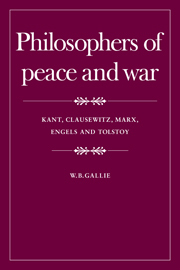2 - Kant on Perpetual Peace
Published online by Cambridge University Press: 24 October 2009
Summary
Kant's celebrated pamphlet, Perpetual Peace, was published in Konigsberg, East Prussia, late in 1795. It is unique among Kant's writings in that it was written for a wide public, and that its publication can be regarded as a political act. It will be useful, therefore, to recall in outline the political situation which gave rise to it.
Prussia had taken a leading part in the war of intervention against the French revolutionary régime. But by the end of 1794 it had become clear that the French would not easily be conquered, and the Prussian government prepared to withdraw from the war, a decision which was ratified by the Treaty of Bâle, signed in January 1795. This event greatly impressed and delighted Kant; for although a political liberal, Kant was a dutiful citizen of autocratic Prussia; and although repudiating political rebellion (and still more regicide), he remained a passionate defender of the aims of the revolution. The new and more hopeful political climate encouraged him to make public his own revolutionary ideas of a revised international law, which he believed to be a necessary condition of any lasting peace. But not all the results of the Treaty of Bâle were to Kant's liking. Released from the war with France, Prussia joined in the third and final partition of Poland, an act which affronted Kant's principles and which he came as near to denouncing in his pamphlet as any Prussian citizen could have dared to do.
- Type
- Chapter
- Information
- Philosophers of Peace and WarKant, Clausewitz, Marx, Engles and Tolstoy, pp. 8 - 36Publisher: Cambridge University PressPrint publication year: 1978
- 2
- Cited by

